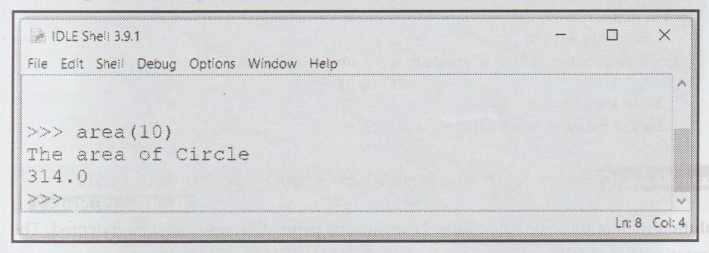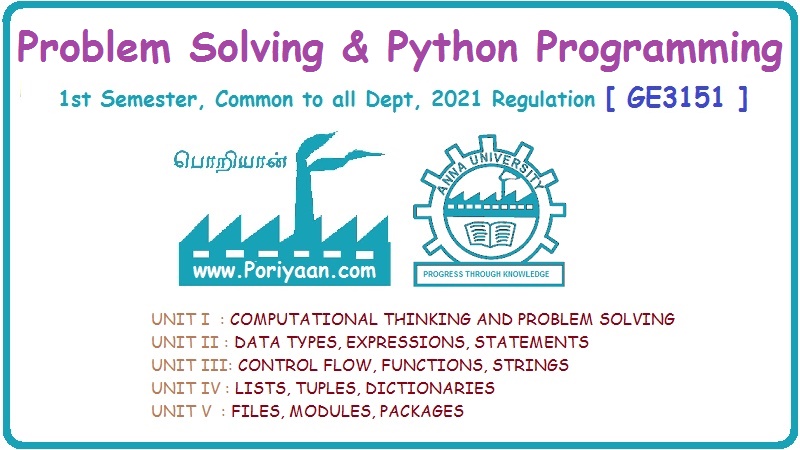Problem Solving and Python Programming: UNIT III: Control Flow, Functions, Strings
Fruitful Functions
Syntax, Example Program | Python Programming
There are two types of functions. 1) The functions that return some value 2) The functions that does not return the value. The fruitful functions are the functions that return values.
Fruitful Functions AU : Jan. 18, Marks 6
There
are two types of functions.
1)
The functions that return some value
2)
The functions that does not return the value. The fruitful functions are the
functions that return values.
1. Return Values
The
value can be returned from a function using the keyword return. For example
Syntax
return
(expression_list]
Example
3.6.1 Write a function that returns area of circle
Solution
:
Step
1 :
Write a function for finding out area of circle in Script mode as
functionDemo.py
def
area(r):
result
= 3.14*r**2
print("The
area of Circle ")
return(result)
Step
2 :
Now press the key F5 to get the output of the above program. Give the function
call by passing some value of radius to it.
The
output will be displayed on the shell window as follows:

2. Parameters
We
can pass different number of parameters to the function. Following example
illustrates the parameter passing to the function
Example
3.6.2 Write a Python program for creating simple
calculator,
Solution
:
def
add(x, y):
return
x + y
def
sub(x, y):
return
x – y
def
mult(x,y)
return
x * y
def
div(x, y):
return
x/y
print("Main
Menu")
print("1.Add")
print("2.Subtract")
print("3.Multiply")
print("4.Divide")
print("Enter
your choice")
choice
= int(input())
print("Enter
first number")
num1
= int(input())
print("Enter
second number: ")
num2
= int(input())
if
choice = = 1:
print(num1,"+",
num2,"=", add(num1,num2))
elif
choice = = 2:
print(num1,"-",
num2,"=", sub(num1,num2))
elif
choice = = 3:
print(num1,"*",num2,"=",
mult(num1,num2))
elif
choice = = 4:
print(num1,"/",
num2,"=", div(num1,num2))
else:
Output
Main
Menu
1.Add
2.Subtract
3.Multiply
4.Divide
Enter
your choice
1
Enter
first number
10
Enter
second number:
20
10
+ 20 = 30
>>>
Example
3.6.3 Write a python program to find the largest among
the three numbers.
Solution
:
def
largest(x, y,z):
if
(x > y) and (x > z):
print("First
Number is largest")
elif
(y > x) and (y > z):
print("Second
Number is largest")
else:
print("Third
Number is largest")
print("Enter
first number")
num1
= int(input())
print("Enter
second number: ")
num2
= int(input())
print("Enter
third number: ")
num3
= int(input())
print(largest(num1,num2,num3))
Example
3.6.4 Write a Python program using function to find the
sum of first 'n' even numbers and print the result.
AU
: Jan.-18, Marks 6
Solution
:
#
first n even numbers
#
function to find sum of
#
first n even numbers
def
evensum(n):
step
= 2
sum
= 0
i
= 1
#
sum of first n even numbers
while
i < = n:
sum
+ = step
#
next even number
step
+ = 2
i
= i + 1
return
sum
#
Driver Code
print("Enter
value of n")
n
= int(input())
print("sum
of first", n, "even number is: ",evensum(n))
Output
Enter
value of n
3
sum
of first 3 even number is: 12
Example
3.6.5 Write a Python program using function to find
the factors of a given number.
Solution
:
#define
a function
def
Find_factors(n):
#
This function takes a number and prints the factors
print("The
factors of,n,"are:")
for
i in range(1, n + 1):
if
n %i = = 0:
print(i)
print("Enter
a number: ")
num=int(input())
Find_factors(num)
Output
Enter
a number :
12
The
factors of 12 are:
1
2
3
4
5
6
12
Example
3.6.6 Write a Python program using function to find
the GCD of two numbers
Solution
:
#
define gcd function
def
gcd(a, b):
while(b):
a,
b = b, a % b
return
a
num1
= int(input("Enter first number: "))
num2
= int(input("Enter second number: ")).
print("The
G.C.D of", num1,"and", num2,"is", gcd(num1, num2))
Output
Enter
first number: 12
Enter
second number: 15
The
G.C.D of 12 and 15 is 3
3. Local and Global Scope
•
The global variables are those variables that are declared and defined outside
the function and can be used inside the function.
•
The local variables are those variables that are declared and defined inside a
function.
•
A global variable is one that can be accessed anywhere. A local variable is the
opposite, it can only be accessed within its frame.
•
The difference between the global and local is that global variables can be
accessed locally, but not modified locally inherently.
•
For example : In the following program, variable a is global variable.
def
fun():
print(a)
#global
scope
a
= 10 fun()
Output
10
Now
consider following program, in which we try to change the value declared
outside the function
def
f():
print(a)
a
= 100 #Due to this statement the
error is raised
#
Global scope
a
= 10
f()
print(a)
To
make the above program work, we need to use global keyword. We only need to use
global keyword in a function if we want to do change that variable.
The
corrected version of above program is as follows:
def
f():
global
a
print(a)
a
= 100
#
Global scope
a
= 10
f()
print(a)
Output
10
100
4. Function Composition
•
Function composition is a way of combining functions such that the result of
each function is passed as the argument of the next function.
•
For example, the composition of two functions f and g is denoted f(g(x)). Here
x is the argument of g, the result of g is passed as the argument of f and the
result of the composition is the result of f.
For
example
Step
1:
Create a simple function for addition of two numbers.
def
add(a,b):
return
a+b
Step
2:
Create a simple function for multiplication of two numbers
def
mul(c,num):
return
c*num
Step
3:
Create a main function in which the two functions used in above two steps are
called.
def
mainFun(x,y):
z
= add(x,y)
result
= mul(z, 10)
return
result
The
complete program will now look like this

Step
4:
Now execute the above program by pressing F5 key. The output can be obtained as
follows -

Problem Solving and Python Programming: UNIT III: Control Flow, Functions, Strings : Tag: Engineering Python : Syntax, Example Program | Python Programming - Fruitful Functions
Related Topics
Related Subjects
Problem Solving and Python Programming
GE3151 1st Semester | 2021 Regulation | 1st Semester Common to all Dept 2021 Regulation
